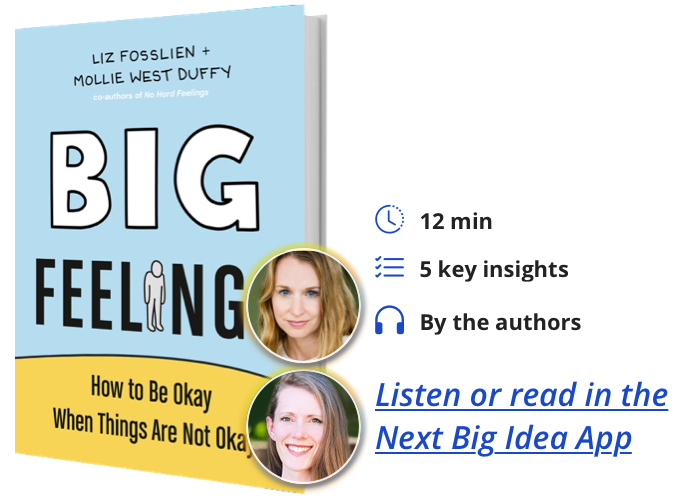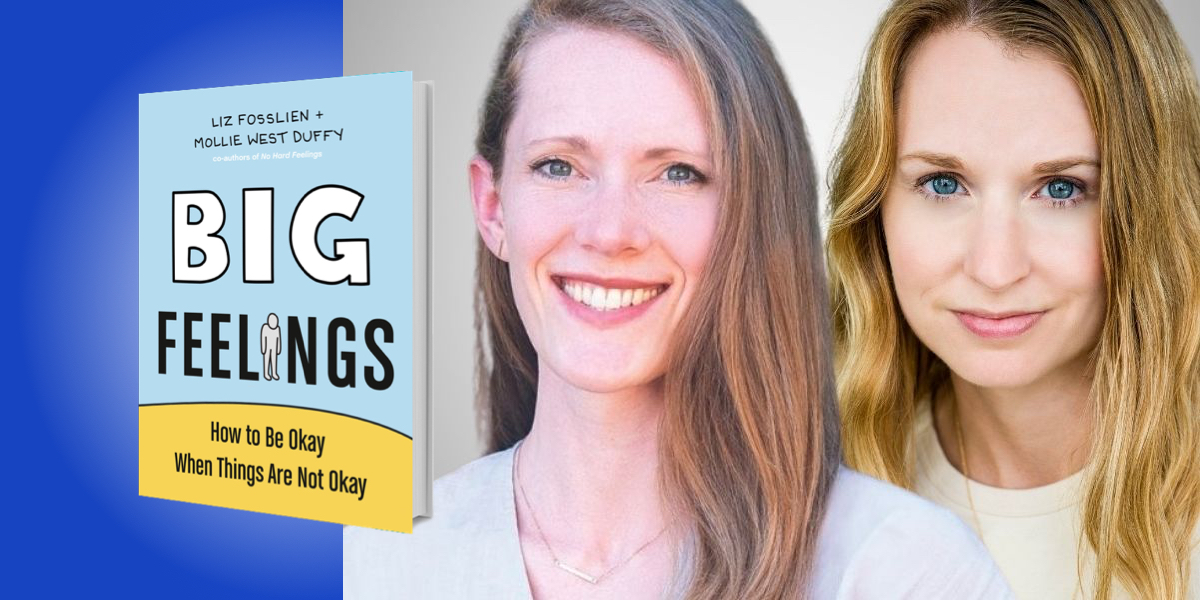Liz Fosslien is the Head of Content at Humu, a company that uses behavioral science to make work better. Her writing and illustrations have been featured by the Economist, the New York Times, NPR, and Freakonomics. Mollie West Duffy is an organizational and leadership development expert who has helped companies and start-ups such as Casper develop good workplace culture. She writes a blog about start-up culture, and has written for Harvard Business Review, Entrepreneur, Fast Company, and Quartz.
Below, Liz and Mollie share 5 key insights from their new book, Big Feelings: How to Be Okay When Things Are Not Okay. Listen to the audio version—read by Liz and Mollie themselves—in the Next Big Idea App.

1. Emotions can be hard, but they’re not good or bad.
Starting at a young age, most of us are taught that feeling bad is bad. In the spring of 2021, as part of our research for this book, we invited readers to take a survey about their emotional experiences. More than 1,500 people responded, and 97 percent said they have heard big feelings described as “bad” or “negative.”
While big feelings are uncomfortable—at times, they can even feel unbearable—they aren’t inherently positive or negative. When we take the time to understand them, big feelings like anger and regret can serve us. Anger fuels us to advocate for what matters, and regret provides us with insight into how to craft a more meaningful life.
When we change the way we relate to big feelings, we take away some of their destructive power. Research shows that when we acknowledge and accept what we feel during challenging moments, we start to feel better. As UC Berkeley researchers put it, “Feeling bad about feeling bad only makes you feel worse.”
2. Envy can reveal what you value—if you know how to decode what it’s telling you.
In your most envious moments, it’s easy to wish you were making a million dollars a year from the corner office, and ignore the responsibilities, stress, and long hours that come with the job. But you need to compare specifics.
A few years ago, I learned that a friend of a friend had been promoted, and would soon be leading a team of 200 people. I was overcome with envy. That night, I lay awake questioning all of my career choices. I have always found days of back-to-back meetings exhausting; I’ve never aspired to run a team of hundreds of people. But there I was, sleepless and miserable about not running an enormous department. “Does my jealousy mean I should shift all my plans?” I wondered. “This whole time, have I been wrong about who I am and what I want?”
“It’s useful to understand that you may not actually want your friend’s big house, but instead covet the sign of prestige it communicates, or the financial security it symbolizes.”
The next morning, I awoke with the certainty that I was still the same meeting-avoidant person—and that I didn’t want to trade places with my newly promoted acquaintance. I wasn’t actually longing for the day-to-day that came with being a manager of managers; I just wanted the prestige and social validation of being able to announce a big, exciting accomplishment.
Thinking through a day-in-the-life helped me realize that I didn’t need to shift my entire career, but instead should keep going on my current path and look for more opportunities to become more visible. It’s useful to understand that you may not actually want your friend’s big house, but instead covet the sign of prestige it communicates, or the financial security it symbolizes. And then you can figure out a better path forward for you.
3. You have to listen to the early signs of burnout.
We think we’ll be able to tell when our brains are fried. But working and living in today’s world can be so emotionally consuming that we don’t even realize the extent of our fatigue. That’s why burnout often seems sudden: it’s the fall after you’ve been unknowingly running on empty for too long.
One of the most dangerous aspects of burnout is that it impacts self-awareness. When you’re in it, you’re running on adrenaline, and the momentum feels so exhilarating that you end up adding more and more to your plate. Once burnout hits, it can take weeks or even months to overcome. So what early signs should you look out for? Here are some of the subtle cues that you might need to reassess how much you’re taking on:
- Basic activities like going to the grocery store feel overstimulating
- You feel so overwhelmed that you’ve started to cut activities you know are good for you (e.g. exercise or alone time)
- You’re saying “yes” even though you’re already at capacity
- Getting sick and being forced to shut down for a bit sounds kind of nice
“Sometimes life taps you on the shoulder with a feather, sometimes it hits you with a brick, and sometimes it runs you over with a bus. Learn to listen when it’s just a feather.”
We’re quick to ignore these signs because we can usually muscle through them—but they’re important alarm bells. As Naveed Ahmad, the founder of Flourish, a company that helps people combat burnout, told us, “Sometimes life taps you on the shoulder with a feather, sometimes it hits you with a brick, and sometimes it runs you over with a bus. Learn to listen when it’s just a feather.”
Once you notice this, you have to set and stick to your own boundaries; no one else is going to draw them for you. You may sometimes wonder, “Why don’t the people who love me help me not overdo it?” Often, it’s because they want you to be successful! A marker of success in our society is being busy—and they may be just as busy as you.
So the next time you’re on the brink of saying “yes” to something you’re not excited about, pause. Ask yourself:
- If I say yes, what do I gain?
- If I do this, what will I not be able to do instead?
- If I say no, what’s the worst thing that would happen?
4. Perfectionism doesn’t serve you—it actually hinders performance.
One of the most destructive aspects of perfectionism is that it prevents us from being kind to ourselves. We fear that if we relax, we’ll become complacent and indulgent. But by obsessing too much over getting it exactly right, we actually undermine our ability to succeed. When high-achievers mess up, they see it as a learning experience, course-correct, and move on. Perfectionists get stuck, revisiting even the smallest mistake over and over, and making themselves feel terrible about even trying at all. This is called the “perfection paradox”: we’re so afraid of failing that we have a hard time doing.
“We’re so afraid of failing that we have a hard time doing.”
But cutting ourselves some slack actually makes us more likely to improve—and less likely to give up. Here are two recommendations for how to move forward with a healthier mindset. And remember: if you slip up here and there on the path to recovery, that’s okay. As with all things in life, it won’t be a perfect process.
- Replace “avoidance goals” with “approach goals.” If your goal is to not fail, you’ll never feel particularly good—and you won’t be thrilled when you achieve it. Instead, start setting what psychologists call “approach” goals (achieving a positive) instead of “avoidance” goals (preventing a negative). For example, if you’re going to give a presentation at work, say to yourself, “I want to impress people with my compelling storytelling” (approach goal) rather than, “I want to avoid looking like I don’t know what I’m doing” (avoidance goal).
- Get rid of “always” and “never.” These words are usually signs that your self-reflection is becoming self-destructive. The next time you catch yourself thinking the words “always” and “never,” reframe the situation. Let’s say that you’re too exhausted after work to join your friends for dinner. Instead of thinking, “I always let people down,” tell yourself, “I’m skipping one event to take care of myself.” You can also remind yourself of all the times you did show up.
5. Regret is painful, but it can help you craft a more meaningful life moving forward.
We feel regret when we think about how our lives could have been better had we only done something differently. But while regret can ache, it can also be a powerful internal compass for how to live an engaged, meaningful life. Learning from your past is one of the most effective ways to set yourself up for a better, less regret-filled future.
Before we get to all that, let’s start with a few basics. Psychologists describe regret as a “counterfactual emotion,” or a feeling that happens when we dream of what might have been, had we only chosen something else (i.e. the “counterfactual”). The amount of regret we feel depends on how close we came to realizing one of those alternate possibilities. If you’re running to catch a train and you miss it by a few seconds, you’ll feel a lot more regret watching it pull out of the station than if you had arrived an hour late. Bronze Olympic medalists were much happier than silver medalists, because the bronze medalists were thrilled to have gotten anything at all. The silver medalists just obsessed over how they could have gotten gold.
Regret can help us learn from the past to improve our future. So the next time you find yourself dwelling on a sentence that starts with “I should have,” try swapping in the words, “What if?” For example, if you think, “I should have been more confident in myself,” ask yourself, “What if I acted with more confidence?” Then write out a few answers to your question.
To listen to the audio version read by co-authors Liz Fosslien and Mollie West Duffy, download the Next Big Idea App today:
































